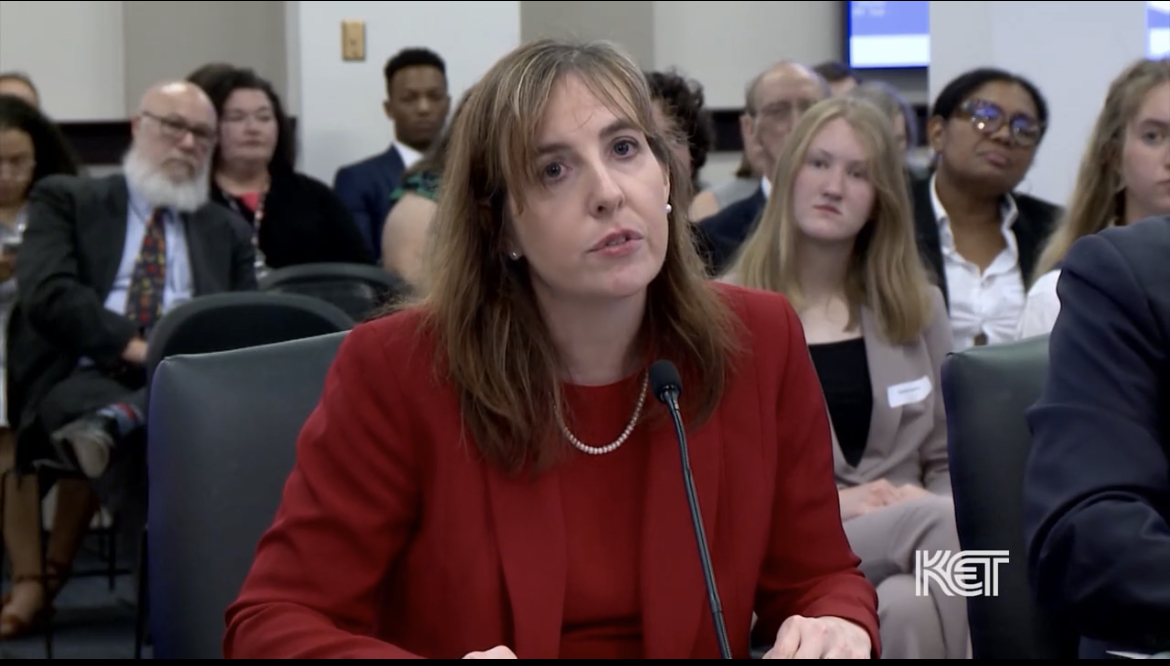
The Interim Joint Committee on Families and Children heard testimony on July 30 from Auditor of Public Accounts (APA) Allison Ball, as well as Cabinet for Health and Family Services (CHFS) Secretary Eric Friedlander on the iTWIST access controversy.
https://kentuckylantern.com/2024/07/30/kentucky-lawmakers-hear-about-ef…
The dispute centers on CHFS concerns about the APA's access to its statutorily protected -- at least as to juveniles -- iTWIST database of neglected and abused Kentuckians that her office must have to discharge the newly assigned duties of Commonwealth's Office of Ombudsman for the Cabinet for Health and Families and Children -- an office formerly attached to the office of the CHFS Secretary.
https://apps.legislature.ky.gov/record/23rs/sb48.html
https://kentuckylantern.com/2024/07/25/welcome-move-to-boost-child-prot…
The testimony confirmed areas of agreement. The APA and CHFS agree that ombudsman access to the database is a necessity. They also agree that the information in the database is confidential and that it's confidentiality must be strictly observed. Finally, they agree that a memorandum of understanding -- alternately known as a memorandum of agreement -- may offer the needed solution to their current impasse.
Representative Josie Raymond first broached the subject of a memorandum of understanding/agreement between the public agencies --legally obligating the parties to its stated terms, conditions, and uses -- in a question to Ball.
Ball seized the opportunity to express support for the idea but stopped short of endorsing terms and conditions of a memorandum of understanding/agreement that CHFS later stated was first suggested in early July.
(That claim went unanswered.)
Both agencies demonstrated an unfortunate degree of public inflexibility that must be tempered -- out of the glare of public scrutiny -- if they hope to resolve their impasse.
CHFS agreed that memoranda of understanding/agreement for the sharing of otherwise confidential information are commonly used within the agency's divisions and between itself and other state agencies. Nevertheless, CHFS insists that 2023's SB 48 bill omits authorization for the sharing of the confidential iTWIST database. CHFS officials are adamant, therefore, that the memorandum must include an APA acknowledgment that CHFS's interpretation of KRS 620.050, and
its legal obligation to maintain confidentiality, is correct. Without this acknowledgment of its interpretation of KRS 620.050 confidentiality requirement, officials suggest, CHFS stands to forfeit federal funding.
https://apps.legislature.ky.gov/law/statutes/statute.aspx?id=55117
The auditor insists that lawmakers omitted nothing and, in fact, did a perfect job in drafting SB 48, adequately addressing the sharing of CHFS records with her office. She dismisses any remaining CHFS objections based on her belief that her office qualifies for access under statutory carve outs found in the KRS 620.050 -- the confidentiality statute on which the Cabinet relies.
Conversely, she argues, the condition for the memorandum of understanding/agreement that CHFS seeks ties her hands in discharging her office's newly assigned duties -- and may have a chilling effect on reporting.
Both invoke competing rules of statutory construction to no constructive end. Chiefly, CHFS asserts that the rule of construction establishing the superiority of specific statutes over general statutes undermines the argument that KRS 61.878(5) -- a general provision in the open records law that promotes public agency sharing of protected information -- compels it to permit APA access to i-Twist, the specific confidentiality statute (KRS 620.050) notwithstanding.
(The Kentucky Open Government Coalition remains unconvinced. In a recent op-ed, we cited KRS 61.878(5) as evidence of legislative support for agency sharing of confidential information in the discharge of a legitimate governmental function -- not as a statutory requirement. We note, however, that under CHFS's interpretation of the rule of construction, it appears to us that sharing of confidential information between public agencies would almost never occur since the same general-specific statute tension exists in every case in which a specific confidentiality statute stands in the way of another agency's access, thus defeating the open records law's general agency sharing statute.)
https://kentuckylantern.com/2024/07/26/lets-not-further-victimize-child…
It would appear that publicly, at least, CHFS and the APA are at loggerheads. But because both acknowledge the necessity of immediate resolution of their dispute, we are hopeful they can settle this dispute outside the public forum -- whether a press conference or a legislative committee meeting peppered with political overtones and innuendo -- in which optics may yield to a joint recognition of the primary need for effective ombudsman oversight of the Cabinet for Health and Family Services and corresponding access to i-TWIST under terms of strict confidentiality.


